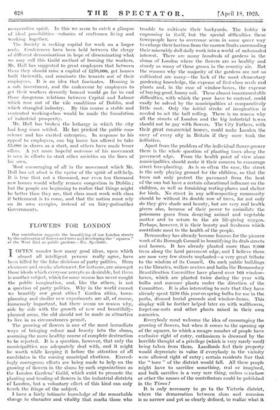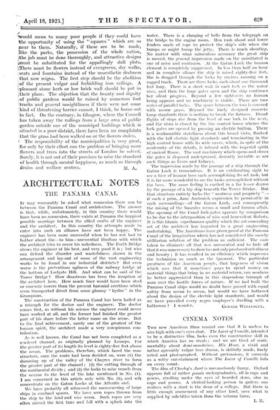FLOWERS FOR LONDON
Our contributor suggests the beautifying of our London streets by the cultivation of flowers and trees and developing the " squares" of the West End as public gardens.—En. Sp3ctator.
IOFTEN wonder how many good ideas, upon which almost all intelligent persons really agree, have been killed by the false divisions of party politics. Slum clearance and smoke abatement, for instance, are aMongst those ideals which everyone accepts as desirable, but there is another subject, which for some reason has never caught the public imagination, and, like the others, is not a question of party politics. Why in the world cannot we beautify our great cities ? Garden cities, townplanning and similar new experiments are all, of course, immensely important, but there seems no reason why, side by side with the growth of new and beautifullyplanned areas, the old should not be made as attractive to live in as circumstances permit.
The growing of flowers is one of the most immediate ways of bringing colour and beauty into the slums, assuming the more healthy course of complete destruction to be rejected. It is a question, however, that only the municipalities can adequately deal with, and it might be worth while keeping it before the attention of all candidates in the coming municipal elections. Exceedingly courageous efforts are being made to help on the growing of flowers in the slums by such organizations as the London Gardens' Guild, which exist to promote the planting and tending of flowers in the industrial districts of London, but a voluntary effort of this kind can only touch the fringe of the subject.
I have a fairly intimate knowledge of the remarkable change in character and vitality that marks those who trouble to cultivate their backyards. The hobby is engrossing in itself, but the special difficulties these townpeople have to overcome seem in some queer way to enlarge their horizon from the narrow limits surrounding their miserably dull daily work into a world of unbounded interest. There are many hundreds of gardens in the slums of London where the flowers are as healthy and sturdy as many of those grown in the country air. But the reasons why the majority of the gardens are not so cultivated are many—the lack of the most elementary gardening knowledge, the expense of first-class seeds and plants and, in the case of window-boxes, the expense of buying good, loamy soil. These almost insurmountable difficulties, with which the poor have to contend, could easily be solved by the municipalities at comparatively little cost. Only the initial stroke of imagination is needed to set the ball rolling. There is no reason why all the streets of London and the big industrial tcwns should not be gay with flowers. The City Fathers, with their great commercial houses, could make London the envy of every city in Britain if they once took the initiative.
Apart from the problem of the individual flower-grower there is the whole question of planting trees along the pavement edge. From the health point of view alone municipalities should make it their concern to encourage street tree-planting. As is so often the case, the street is the only playing ground for the children, so that the trees not only protect the pavement from the heat of the sun but have a certain educational influence on the children, as well as furnishing resting-places and shelter for birds. No street in any self-respecting community should be without its double row of trees, for not only do they give shade and beauty, but are very real health givers also, because of their power to assimilate the poisonous gases from decaying animal and vegetable matter and -to return to the air life-giving oxygen. Perhaps, however, it is their beauty and freshness which contribute most to the health of the people.
Bemiondsey has already become famous for the pioneer work of its Borough Council in beautifying its drab streets and houses. It has already planted more than 9,000 trees along the hard pavement edge, and I believe there , are now very few streets unplanted—a very great tribute , to the wisdom of its Council. On such public buildings as the libraries, welfare centres and baths the Bermondsey Beautification Committee have placed over 160 windowboxes, which are planted twice during the year with bulbs and summer plants under the direction of the Committee. It is also interesting to note that they have already spent £250 this year on spring bulbs for use in the parks, disused burial grounds and window-boxes. This display will be further helped later on with wallflowers, forget-me-nots and other plants raised in their own nurseries.
Everybody must welcome the idea of encouraging the growing of flowers, but when it comes to the opening up of the squares, to which a meagre number of people have exclusive right of entry, enthusiasm is drowned by the horrible thought of a privilege (which is very rarely used) ' being taken from them. Landlords feel their property would depreciate in value if everybody, in the vicinity were allowed right of entry ; certain residents fear that the " tone " of the district would fall. All these people might have to sacrifice something, real or imagined, and bulk sacrifice is a very rare thing, unless scmehow or other the names of the contributors could be published in the Times/ It is .only necessary to go to the Victoria district, where the demarcation .between slum and mansion is so narrow and yet so clearly, defined, to realize what it "mould mean to many poor people if they could have )the opportunity of using the " squares " which are so ;near to them. Naturally, if these are to be made, Pike the parks, the possession of the whole nation, ';the job must be done thoroughly, and attractive designs paust be substituted for the appallingly dull plots. There must be flowers instead of evergreens, dry walks, I seats and fountains instead of the unaesthetic drabness that now reigns. The first step should be the abolition ; of the present vulgar and forbidding iron railings. A vleasant stone kerb or low brick wall should be put in their place. The objection that the beauty and dignity j of public gardens would be ruined by numerous foot I tracks and general unsightliness if there were not some ;kind of threatening barrier cannot, I think, be borne out in fact. On the contrary, in Glasgow, where the Council t has taken away the railings from "a large area of public ;garden outside one of the municipal buildings which is jsituated in a poor district, there have been no complaints .that the grass had been walked on or the flowers stolen. I The responsibility of the municipalities is very great, for only by their effort can the problem of bringing more !flowers and trees into the streets of London be solved. Surely, it is not out of their province to raise the standard of health through mental happiness, as much as through drains and welfare centres. M. A.











































 Previous page
Previous page